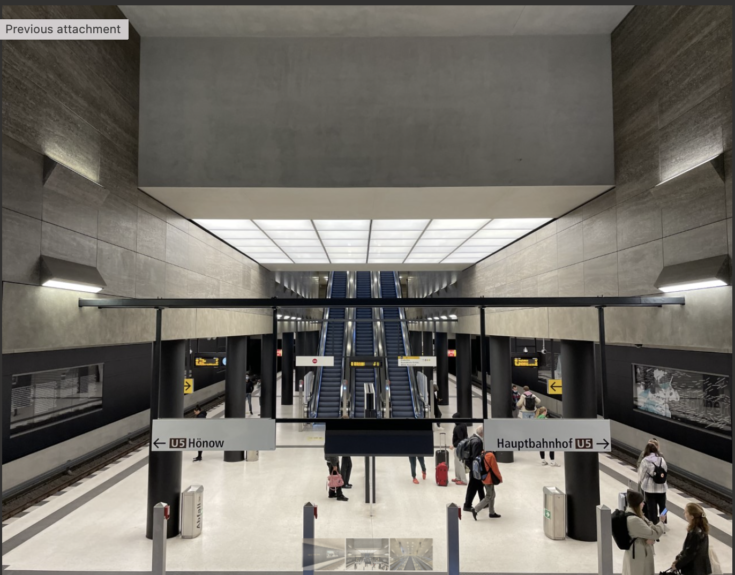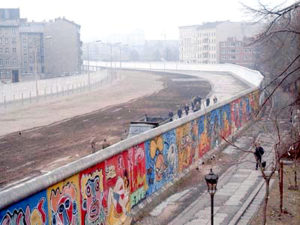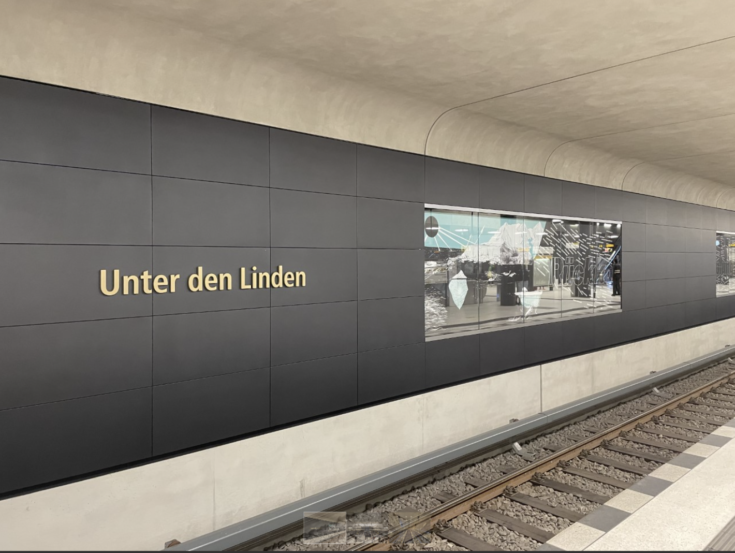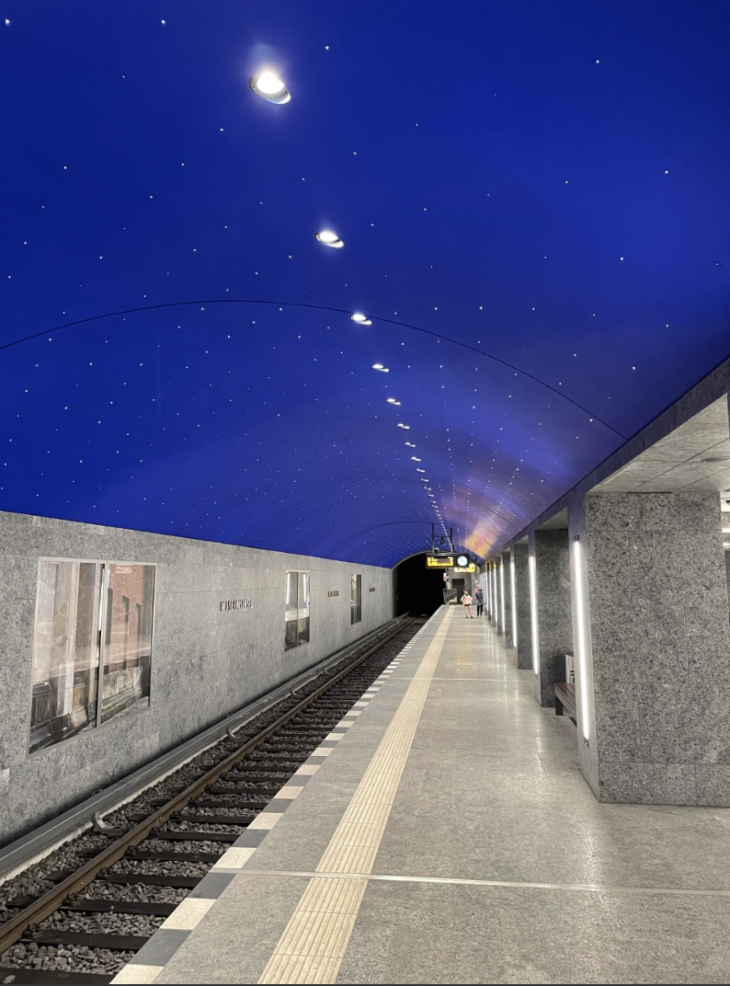

I visited the DDR (also known as East Germany) back in the summer of 1990—just three months before that unhappy country ceased to exist. After retiring in mid-September, my wife and I decided that East Germany was an ideal spot for a late summer vacation. It isn’t–the weather was cool and rainy. Nonetheless, the trip was still instructive, and even enjoyable at times.
In 1990, I was struck by the grey and drab look of East Berlin. The buildings were still pockmarked by bullet holes from WWII. The other city I visited (Dresden) was still partially in ruins. It was sad to see the pointless destruction inflicted on its beautiful baroque buildings, especially given that the war was all but over in February 1945. (Full disclosure: My dad was a mechanic at a US bomber base in Thetford, England during WWII.)
I am happy to report that both cities have been rebuilt. We arrived at a beautiful (and long delayed) new Berlin airport which opened in 2020, and our hotel was right next to a brand new subway line that opened the same year. You cannot imagine a bigger contrast with New York’s subways—the attractively designed stations did not have any graffiti at all. The central part of the line has three new stations and cost about 550 million euros. In NYC, a similar recent project cost 4 billion euros.
Overall, the scale of change in central Berlin since 1990 has been stunning (especially on the east side and the wall area), more comparable to a Chinese city than to an older European capital. I can’t imagine why some East Berliners still vote for the renamed communist party (now called the Left Party.) Berlin is a textbook illustration of the superiority of capitalism over communism. (Yes, part of the cost was born by German taxpayers, but what economic system allowed western Germany to have the resources to rebuild the failed communist experiment in the east?)
Countries that unified relatively late, such as Germany and Italy, have smaller national capitals than countries with long continuous histories such as Britain and France. What I like best about Berlin is its modesty. I recall reading that Berlin is the only capital city in the world that is poorer than the nation over which it governs. (Is that still true?). I suspect that the ratio of a capital city’s per capita income to the nation’s per capita income is a fairly decent index of corruption. Let’s hope that Berlin remains modest. It has a nice mix of modern and traditional architecture, and a great new museum.
Dresden is one of my favorite European cities, full of interesting museums. We spent 2 1/2 days there, but could easily have spent twice as long.
This was our subway stop in Berlin:


And here’s the starry ceiling of another station:


READER COMMENTS
Jose Pablo
Sep 30 2022 at 9:08am
I have always found very telling that DDR stood for German Democratic Republic.
Always wondered: Democratic, as opposed to the dictatorial Federal Republic of Germany?
For me this was the perfect example of Hayek’s End of Truth.
Mark Brophy
Oct 4 2022 at 9:50am
Democracy is the worst form of government. A republic works better even though it’s more dictatorial. Singapore works very well even though it’s dictatorial. Hong Kong and South Korea worked just as well when they were dictatorships as they work now as democracies because a democracy is only as good as the voters, who are usually bad.
Capt. J Parker
Sep 30 2022 at 9:53am
That’s THE question, isn’t it? I would think the most apparent answer is that while capitalism produces more, the unequal distribution of the output and social influence does create problems that every first world nation tries to address in some way.
The debate really should be one of how much economic inefficiency are we willing to tolerate in order to achieve an acceptable distribution of output. This debate rarely happens. More often you hear people will claim that their favored political economic system will achieve both more output and more equitable distribution.
Jon Murphy
Oct 1 2022 at 9:18am
Given that communism had much greater inequality than liberalism, I don’t think inequality can be an explination (except for those unaware of life under the DDR)
Dylan
Oct 1 2022 at 10:54am
It’s interesting, for most of my life my first hand accounts of life behind the Iron Curtain came from those who had escaped and, unsurprisingly, they talked about how horrible life was. In more recent years, I’ve traveled more in eastern Europe and had a chance to talk with people that didn’t leave, and the story is not as nearly clear cut for them. Talk about the social repression and the lack of lots of stuff, but also lots of talk about both being more self reliant (if something broke, you best be able to figure out how to fix it yourself) while also (paradoxically) feeling like you had less overall to worry about, you just had to show up, do the minimum, and you’d be (minimally) taken care of.
There’s obvious selection bias going on, those that left were the ones most motivated to do so. And, I’m sure there is a nostalgia for youth that is tinting things, but still I have found it surprising just how much fondness for the “old ways” I’ve come across when chatting with people in their 50s and 60s in my travels.
Matthias
Oct 1 2022 at 9:22pm
Oh, it’s definitely mostly nostalgia.
I remember my relatives talking about live in the DDR. (I was too young when it fell.) Over the years their reminiscenes have become more and more rose coloured. Especially when complaining about something specific they don’t like about current conditions, and drawing up a comparison with a specific aspect in the DDR.
That nostalgia is especially striking, because on a factual level I know for a fact that many of them were treated pretty badly during the DDR: for example my great-grandfather on my father’s side was a pastor, and that didn’t endear the family to the authorities to put it mildly.
Capt. J Parker
Oct 3 2022 at 1:01pm
Thomas Piketty’s data says that, by one measure, income inequality in the USSR was less than in today’s Russia. For the DDR there is a lot written about Germany’s economy immediately after reunification. The expectation was that the unemployment would be the most serious problem in the former DDR after reunification. In capitalist countries one of the most important contributors to income inequality is unemployment.
I worked closely for a couple of years with an engineer who left post-communist Russia with his wife (also a professional) for the US. He was old enough to have been a working adult in the Soviet Union. One thing he said about life under communism that stuck with me was “Some things were hard to get, yes but but it wasn’t so bad – there was no unemployment.” This seems to me to be right in line with Dylan’s comment that under communism people thought they had fewer things to worry about.
Interestingly, Dr. Sumner’s photos of subways aren’t really about capitalism, they are about socialist redistribution. Don’t forget, we all heard about the Moscow subway vs the New York City Subway .
I’m actually less interested in why Germans would vote for Communists than I am in understanding why Americans would vote for one.
Jose Pablo
Oct 1 2022 at 12:25pm
Taking into account what Jon points out and also that the main driver of the 10th decile income level (PPP) is GDP per capita (it is not, but if it was the case why should “inequality” be more relevant that the actual level of income for the worst 10% of the population?), the real question is why informed and very functional minds keep repeating a narrative that has no connection with the facts whatsoever?
Gorgasal
Sep 30 2022 at 9:58am
Of course, Unter den Linden is one of the most central subway stations and a bit of an exhibition piece. But I agree that public transport in Germany, and in Berlin, is much better than in other parts of the world. I also agree that Berlin has changed phenomenally since the fall of the Berlin wall – I was there with my school in 1991, and the contrast between East and West was incredible. I also don’t understand why people in Berlin keep voting for the rebranded communists – I assume it’s less about politics, and more about identity. A pity.
However, regarding governance in Berlin, just yesterday there was a fun court decision: a year ago, there was an election for the state legislature, and it went horrendously wrong. In some polling stations, there were not enough ballots, so people voted with copies, which were counted as valid, which is illegal… other polling stations had the wrong ballots… because people had to copy ballots (or collect new ones from the central administration), some polling stations decided on their own to just stay open for an hour after the official closing time, by which time there were already outcome projections being communicated, which is also illegal… it didn’t help that the Berlin authorities thought it might be a good idea to hold the Berlin marathon on the same day, on which there was not only the state legislation election, but also the federal one, and also a number of other ballot measures – far more than the voting commission had ever organized. Well, the state court just returned a verdict that is rather embarrassing for the reigning bureaucracy: the state election has to be completely redone, in the interest of everybody’s trust in democracy.
(Nothing about the federal election on the same day, which of course had the same problems, presumably because the state court was simply not competent on this issue. The fun part: in that federal election, the Left party got two out of their three direct representatives in Berlin – and without three direct representatives, their entire slate would not be in the federal Bundestag, so if the federal election were also to be repeated, it might be that all ~30 Lefts might not make it back into the Bundestag…)
Jens
Oct 1 2022 at 5:41am
It is understandable to wonder somewhat why many Eastern Germans still vote for the successor organization to the former Communist Unity Party.
But you have to put it in perspective. Among the blind, the one-eyed man is king.
In large parts of Eastern Germany, the strongest party is an openly radical right-wing party whose ranks include many long-time neo-Nazi bigwigs and whose vice chairwoman was – until early last year – a prominent member of the Friedrich A. von Hayek Society and whose departure there was regretted by many.
But yes – public transport in Berlin is quite ok.
Matthias
Oct 1 2022 at 9:16pm
The PDS (and later die Linke) were popular before AfD was around.
I suspect the AfD actually took voters from them more than from the mainstream parties?
Monte
Oct 1 2022 at 9:40am
Possibly. Two examples that immediately come to mind are Pyongyang and Moscow. It would be interesting to see if this fleshed out on a global scale.
Communism is a comfort zone, where Capitalism remains a more foreign concept, as this Pew Research Center survey might suggest:
Among Germans, there is far more support for a close relationship with Russia in the former East than in the former West. Additionally, Germans living in former East Germany tend to view Russia more favorably and the EU less favorably than those living in the former West.
Scott Sumner
Oct 1 2022 at 4:23pm
Monte, You said:
“Among Germans, there is far more support for a close relationship with Russia in the former East than in the former West. ”
I don’t doubt this, but it seems weird. East Germans who tried to walk to West Berlin were literally machine gunned down by the communists. If I were an East German, I’d resent that sort of government. And it’s not like all of that repression produced a silver lining like economic growth—East Germany was poor.
On the other hand, with the rise of authoritarianism throughout the world, we are finding that many voters simply don’t care about freedom.
Craig
Oct 1 2022 at 6:02pm
There is a concept of Ostalgie which I think the only way to describe it to an American would be to liken it to the relationship between North/South in the US. The Wiedervereingung wasn’t a merger of equals. 30 years on the former East German states are about 1/3 less prosperous than their West German counterparts. Indeed, they are much better off than they were under the DDR. Exacerbating these feelings Brandenburg was historically the premier German state, so they were on top of the German pecking order and now they’re on the bottom.
Mark Z
Oct 1 2022 at 11:43pm
Probably many viewed it as something like a conquest by a foreign enemy (which they were likely taught to believe West Germany was) rather than merely a regime change, especially since there were already noticeable enough cultural and linguistic differences between East and West Germans, so that probably makes it harder to swallow that the new regime is superior to the old. For that reason I suspect it may already have been too long since the division of Korea for reunion to be politically viable anymore there.
Matthias
Oct 1 2022 at 9:15pm
I wonder if that’s why Singapore has so little corruption? Our index is exactly 1.
I was born in East Germany. I recently visited again.
It’s good that you can see how things have improved. My main impression was how drab and run downany things were and that you can still see the occasional industrial ruin from when ex-DDR heavy industry collapsed.
(The impression of shabbiness I got was probably strengthened by me now being used to Singapore standards..)
I was also struck in general by how comparatively little had changed since when I left in 2009. All the while my old friends pointing out that ‘so much’ new stuff had been build. Different standards, I guess.
My adopted home is casually in the process of doubling our train network. Meanwhile many train lines connecting cities in East Germany are still single tracked, because the USSR took the away the second track as reparations. And no one bothered to reinstall.
Scott Sumner
Oct 2 2022 at 2:13am
I suppose that what I saw in East Berlin and Dresden were the above average parts of East Germany, but the changes over 32 years were truly dramatic.
LC
Oct 2 2022 at 3:47pm
Scott:
I visited Berlin in late August. I was struck by the energy of the city. It’s my first visit but looking at the newly built royal palace (which replaced the awful former People’s Palace) and the new corporate office blocks, the city seemed to have a more up and coming feel than other European capitals. The only rundown place seemed to be the walled off Russian embassy. (It’s got fences around it to prevent people throwing things at it.). Germany may have a tough winter ahead but after visiting I feel more optimistic about Europe and its prospects ahead than the bleak news stories suggest.
Thomas Strenge
Oct 2 2022 at 6:37pm
I’m a native East German myself before escaping to the West and eventually emigrating to America. Speaking with my family, I think there’s still resentment in how much reunification was carried out. It was perceived as a West German takeover. Everything made in East Germany was perceived as substandard regardless of fact (and much was, but not everything). East German degrees were viewed as inferior, but math is math, German language is German language, etc. That left bitterness and fueled Ostalgie.
bb
Oct 3 2022 at 5:34pm
Thomas,
I had East German in-laws and spent some time there in the 2000s. I think you describe it best. The West was very generous, but they reminded the East Germans how generous they were often. And the people I knew resented the idea that everything in the west was better. It was their country for over 40 years. It’s Ok to admit that East Germans managed to produce a few nice things.
My experience is that when pressed, most of them would admit that the DDR was bad, but I think part of it is thumbing their nose at the West Germans.
Also, it’s a risk free position to take. When faced when the prospects of actually reinstating the DDR, I think a lot of votes would shift. Fascinating place though.
Thomas Strenge
Oct 3 2022 at 9:00pm
Thank you and I fully agree. Pride is man’s most important important possession, especially once they’ve lost everything else.
Sam
Oct 3 2022 at 8:54am
Nice reflective piece. I still remember vividly my one sunny day touring East Berlin as a college student on summer vacation in 1966. The pervasive negativity of everything was unforgettable, from the visual drabness of the city through the news crawler over a major street reporting bad news about the United States, to the self-intoduction as “studying Russian” of an adjacent diner in a restaurant that stopped dead my & my college pals’ merry, even boisterous, conversation with 3 young East Berlin age-mate mechanics we had met & asked on a whim to ride around with us that day. Afterward, back in our car with them, we were all merry again, & when we told them we had to drop them off before we exited via Checkpoint Charlie, one yelled “No, drive straight through!” & we all roared with laughter. It was a wonderful youthful moment.
Sam
Oct 3 2022 at 9:07am
Oh, & the continuing appeal of socialism (in its deepest form, communism) despite its universal failures is easy to understand: it promises a society of no conflict where everyone is taken care of. Ignoring the permanence in human nature of motivations to dominate & acquire, such a society can only be created & sustained with massive coercion. And on a merely functional economic level, socialism has never solved its fundamental problems of valuation, motivation, compensation & calculation
Comments are closed.